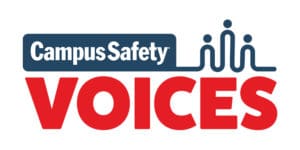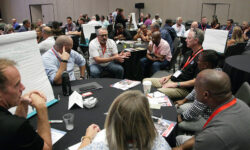How Campuses Play an Integral Part in Welcoming Refugees
Here’s how Virtua Health assisted refugees fleeing Afghanistan and how these practices might apply to other organizations helping refugees.
Listen to this podcast using the embedded player below
Tens of thousands of Afghan refugees have resettled across the U.S. over the past year or so, and many American hospitals, institutions of higher education, and other organizations were tasked with providing medical care, housing, and other services to many of the Afghans fleeing their country.

Campus Safety Voices, available on Spotify and Apple streaming platforms, features timely conversations on a wide range of topics affecting K-12 schools, institutions of higher education, and healthcare facilities.
Since then, millions of Ukrainian refugees have been forced to flee their homeland due to the Russian invasion of their nation, and about 100,000 Ukrainian refugees will soon be coming to America. Once again, many U.S. campuses will be stepping up to care for these refugees.
In light of this development, I reached out to Virtua Health AVP of Environmental Services, Security, and Safety Paul Sarnese so he could tell us about Virtua’s Mount Holly facility’s experience last year in helping more than 1,000 refugees from Afghanistan.
In my interview with Sarnese, who is also one of this year’s Campus Safety Director of the Year finalists, he describes what was all involved in the process.
“Each of the refugees was coming with a military escort, as well as a translator, which made our process a lot easier, but we had to learn a lot,” he says. “Refugees were coming with no ID, no known date of birth, and really no medical history, so there were some challenges.”
Combine those issues with the surge in COVID-19 Delta variant cases that was happening at the same time, and the task at hand for Sarnese and his team was huge. They needed to work closely with many federal, state, and county governments, private organizations, and non-governmental organizations. Additionally, communications with local first responders and the local military base was critical.
“Taking care of a village? You need a village to take care of a village,” he says.
Fortunately, his organization had quite a bit of previous experience in helping refugees: in 1999, refugees from Kosovo and in 2010, refugees from Haiti. That said, there were some aspects that were unique to Virtua’s guests from Afghanistan.
Everything had to be translated into three different dialects, including welcome signs, instructions on how to put on a mask, signs about visitation, and more. Staff had to be trained on cultural sensitivity. There were dietary challenges, identifying space for prayer, obtaining disposable prayer rugs, and more.
Although each group of refugees coming to the U.S. has their own unique set of circumstances, there are some promising practices covered by Sarnese that most likely apply to other organizations assisting any refugee population.
In my interview, Sarnese specifically addresses the following:
- His department’s role. 4:14
- What was involved in this process. 6:35
- Some of the biggest challenges faced during this process, as well as successes. 9:00
- Considering our nation will soon be welcoming thousands of refugees from Ukraine, advice for other healthcare security professionals tasked with assisting them or other refugees. 11:22
If you appreciated this podcast and want to receive more valuable industry content like this, click here to sign up for our FREE digital newsletters!
















